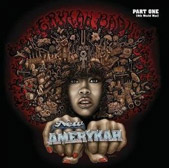 Erykah Badu has always been a mystery. From the 1997 release of “Baduizm,” she blazed the trail for neo-soul as a genre, but she also brought with her a raw spirituality that made her god no particular god. It was an untouchable spirituality so firmly planted that it seemed like Badu had created a neo-spirituality—Baduizm—that was all her own (and one that would allegedly spread to her lovers, who have included Outkast’s Andre 3000 and Common).
Erykah Badu has always been a mystery. From the 1997 release of “Baduizm,” she blazed the trail for neo-soul as a genre, but she also brought with her a raw spirituality that made her god no particular god. It was an untouchable spirituality so firmly planted that it seemed like Badu had created a neo-spirituality—Baduizm—that was all her own (and one that would allegedly spread to her lovers, who have included Outkast’s Andre 3000 and Common).
But this never concerned me as a Christian, so for nearly ten years I fed into Baduizm. I was enlightened when she spoke of our being made in His image on “Baduizm.” I went through the motions of love–self and other–on “Mama’s Gun.” And I pumped my fist on “Worldwide Underground.”
But all that stopped when I heard her latest album, “New Amerykah.”
“Humdililah, Allah, Jehovah, Yahweh, Dios, Maat, Jah, Ras Stafari, fire, dance, sex, music, hip hop … It’s bigger than religion.” These are the first words one hears on the “The Healer,” the first full-length musical track on “New Amerykah.” It was a statement that gave me pause and struck me as blasphemous. For the first time, I felt like I was hearing Badu’s music with ears trained to sift the wheat from the chaff.
But the next four tracks played seamlessly into one another. Badu examines how the trials and tribulations of her life have shaped her on “Me.” In “My People,” she encourages her people to hold on over a schizophrenic beat and a repetitive verse. She then morphs into a freedom fighter on “Soldier,” saluting the warriors of this generation from the victims of Katrina to the soldiers in Iraq. This was inspiration at its finest from the queen of preaching restoration to her people.
So far the album was well on its way to becoming one of my favorites. Then a little fox by the name of “Twinkle” came into the vines. It is a hodge-podge of a song produced and written in classic Badu style–which means there are plenty of complex thoughts and symbolism, but they don’t connect to make a cohesive statement. On the song she raps about “they,” the collective that might be the government–but she may be referring to the Five-Percent Nation, a belief that 85 percent of the people are blind to the truth about themselves, 10 percent know the truth (but use it to hold the 85 percent in captivity), and five percent are enlightened beings. (Badu was allegedly connected to this group).
I was utterly confused because I couldn’t tell where she was going with this song. And then came the moment that forever changed my thoughts about the music of Erykah Badu.
At the 4:28 mark of “Twinkle,” an otherworldly instrumental started to play. This goes on for a few seconds, and then a man begins speaking in another language. During his speaking/chanting, my spirit curled up inside of me and begged me to turn it off. There was something inherently strange about the unknown chanting that I didn’t believe was edifying to my spirit.
I was certain that it wasn’t of God, because every time I played it, my spirit was unsettled and disturbed. I tested it on another friend, but she wouldn’t even let me play it all the way through. I searched high and low to see if anyone had deciphered this strange language, and no one was certain. Was it a dialect of the African Bushmen? Was it the ancient African language of Mdw Ntchr, otherwise known as Metu-Neter? Why didn’t Badu provide an explanation in the liner notes of the album? What was going on inside of me and on that disc that had me so certain I couldn’t entertain her music any longer?
I can’t be sure of what language it was or the intention behind it, but what I can be sure of is the leading of the spirit (meaning the Holy Spirit), which made it clear that this is nothing to play with. This one song ruined the entire album for me. I don’t take joy in admitting that because I respect Erykah Badu as an artist. But while I deeply respect her talent, I have no tolerance for music that will confuse–or harm–the people of God.
“New Amerykah” is indeed a spiritual movement for Badu, and could possibly be considered one of the best albums of her career, but I believe it is also a call for each of us to use spiritual discernment to determine what is edifying to our spirits and what is meant to slowly tear us down. This album made me realize I cannot afford to be glib with the things I listen to and still expect my spirit to remain intact.
This same argument can be made for all secular music, and I believe “New Amerykah” is the impetus for me to be more cautious. My final decision is that this is a bonfire-burn of an album (but don’t dance around it). It’s too hot to handle and nothing to play with unless you know someone who can translate the ancient unknown language on “Twinkle.” And when you find out what the guy is saying, please let me know.
By the way, if you don’t know what “Burn or Burn” is all about, read about it here.

